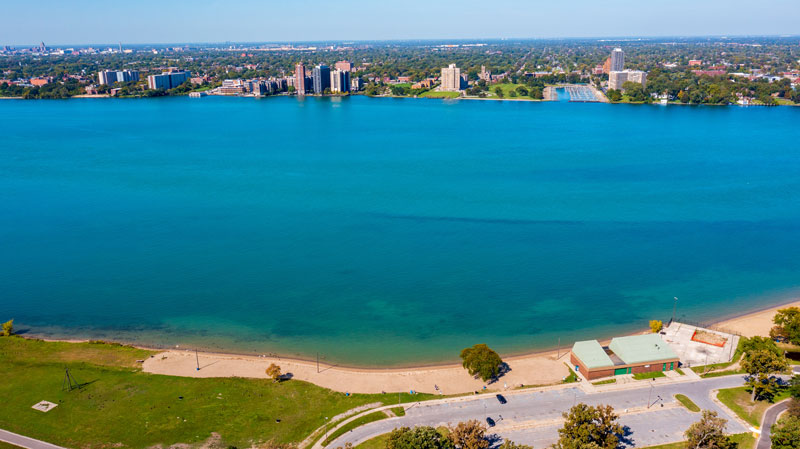
A report card released Tuesday by five southeast Michigan river and watershed organizations gave grades that range from C to D+ when assessing the current state of the Clinton, Detroit, Huron, River Raisin, and Rouge rivers.
Overall, southeast Michigan scored 49 percent, a C grade, showing some areas of strength and other areas needing improvement in the report done in partnership with the University of Maryland Center for Environmental Science (UMCES).
River-specific grades are:
- Clinton River Watershed: 51 percent, C
- Detroit River Watershed: 44 percent, C-
- Huron River Watershed: 58 percent, C+
- River Raisin Watershed: 54 percent, C
- Rouge River Watershed: 36 percent, D+
Each river and watershed’s condition is determined by 33 indicators in six categories: Water, Economy, Ecosystem, Human Health, Infrastructure, and Recreation. Overall, the highest scoring category was Recreation with 63 percent, a B-. Overall, the Human Health category scored the lowest with 38 percent, a D+. Infrastructure and Economy both had C- grades while Ecosystem and Water were slightly better, both Cs.
“These report cards can help inform decision making about restoration and management across the southeast Michigan region,” says Alexandra Fries, program manager at UMCES. “Report cards distill data into a grade similar to what students receive in schools, which helps to communicate complex information in a way that broad audiences can easily understand.”
Rebecca Esselman, executive director of the Huron River Watershed Council, says: “While the health of southeast Michigan’s rivers and watersheds has improved over the past 50 years, there continues to be room for improvement. Conditions might be moderate overall, but there are problem areas we know about that we must work hard to address.”
One of the more urgent issues, according to the report cards, is severe flooding from stormwater. Replacing forests and wetlands with buildings and pavement, channelizing, and burying streams, and building developments in floodplains has made floods more common, extreme, and impactful.
The high cost of flooding impacts local economies by damaging properties and destroying crops. In the Rouge and Detroit watersheds, floods overwhelm aging infrastructure, releasing diluted raw sewage into waterways. Sewage and other waste impacts river water quality and can cause human health concerns, impede recreation opportunities, and harm fish populations.
“Metro Detroit’s aging infrastructure heavily relies on combined sewers that collect both sewage and surface water,” says Marie McCormick, executive director of Friends of the Rouge. “Heavy rain can cause these combined sewers to overflow, resulting in untreated sewage flowing into rivers and lakes.
“Metro Detroit must invest in a combined green-gray infrastructure approach. This approach mixes rain gardens, green roofs, and permeable pavement with conventional approaches like underground detention and retention systems, upgraded pipelines, and wastewater treatment plants.”
The report cards were created by UMCES and the southeast Michigan watershed organizations including: the Clinton River Watershed Council, the Friends of the Detroit River, the Huron River Watershed Council, the River Raisin Watershed Council, the Friends of the Rouge, along with Council Fire. More than 100 stakeholders helped develop the report cards including scientists, government officials, business owners, and local community members.
The report card project was supported with funding by the Fred A. and Barbara M. Erb Family Foundation.
For more information about the Southeast Michigan Report Cards, including watershed-specific data and detailed analysis methods, visit MichiganReportCards.org.





